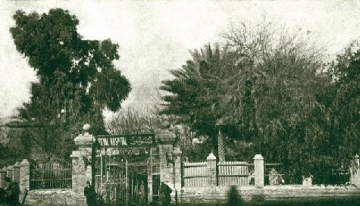The views expressed in our content reflect individual perspectives and do not represent the authoritative views of the Baha'i Faith.
Beginning at sunset today, Baha’is all around the world will celebrate the “King of Festivals,” the holiest twelve days of the Baha’i year.
This celebration started in the place where the Baha’i Faith had its beginnings—appropriately enough, in a beautiful garden called the Garden of Ridvan (pronounced rez-vahn).
In Arabic, Ridvan means paradise—and that rose-scented, birdsong-filled garden witnessed the birth of the world’s newest independent religion on April 21, 1863.

Entrance to the Garden of Ridvan in Baghdad.
Situated on an island in the Tigris River near Baghdad, the garden of Ridvan marked the exact spot where Baha’u’llah first declared his mission and inaugurated the Baha’i Faith. Baha’u’llah’s momentous declaration happened during the twelve day period before his banishment to Istanbul, Turkey (then called Constantinople).
A decade before, in 1853, the Persian government had exiled Baha’u’llah to Baghdad, fearing the rapid spread of his spiritual teachings and their progressive impact on a closed, constrained society. In April of 1863, because his influence continued to spread and threaten the clerics, Baha’u’llah faced a second exile. A Baha’i historian recounted the situation:
At last the enemies of the Cause secured from the government authorities an order banishing Baha’u’llah from Baghdad. It first read that he should go, alone. But later this was changed, permitting his family and a few followers to accompany him. The band of exiles left Baghdad and paused, first, in a beautiful garden outside the city. Here they sojourned for twelve days. A tent was pitched for Baha’u’llah, and around it the tents for the others. These days in the garden are called “The days of Ridvan” and they are of supreme importance, for it was then that Baha’u’llah declared, to a few followers, his great mission and began to build the palace of peace and unity for the world. He revealed many wonderful verses which sing the melodies of the New Day of God.
When the twelve days were over, the party, mounted on horses and donkeys and guarded by Turkish soldiers, set out again. The believers who could not accompany them were utterly broken-hearted. It was as though Baha’u’llah was a king starting upon a glorious journey. Outwardly, an exile—but in his spirit a great light was shining. – Jinab-i-Fadil, Star of the West, Volume 8, pp. 325-326.
The exiles made a grueling, arduous four-month journey to Constantinople, over the deserts and mountains of Asia Minor in the heat of summer. During that period Baha’u’llah gradually proclaimed the mission of his new Faith—the oneness of humanity and peace between all nations—to a widening circle of believers.
With this profound announcement, Baha’u’llah transformed the occasion of his banishment from crisis to victory.
So the twelve days of Ridvan—which Baha’is observe this year from sunset on April 20 to May 2—commemorate Baha’u’llah’s sojourn in the garden, and celebrate the birth of his new Faith. During the festival of Ridvan, Baha’i communities and their friends around the world remember Baha’u’llah’s banishment from Baghdad to Istanbul, not as a time of sorrow or regret, but as a joyous outpouring of revelation and renewal.
For Baha’is, the Ridvan period demonstrates the power of the prophet of God to create human happiness, bring forth light from darkness, and win triumph from seeming defeat. Abdu’l-Baha, the son of Baha’u’llah and the head of the Faith after his passing, explained:
The Persian government believed the banishment of [Baha’u’llah] from Persia would be the extermination of his cause in that country. These rulers now realized that it spread more rapidly. His prestige increased, his teachings became more widely circulated. The chiefs of Persia then used their influence to have Baha’u’llah exiled from Baghdad. He was summoned to Constantinople by the Turkish authorities. While in Constantinople he ignored every restriction, especially the hostility of ministers of state and clergy. The official representatives of Persia again brought their influence to bear upon the Turkish authorities and succeeded in having Baha’u’llah banished from Constantinople to Adrianople, the object being to keep him as far away as possible from Persia and render his communication with that country more difficult. Nevertheless the cause still spread and strengthened. – Abdu’l-Baha, The Baha’i World, Volume 9, p. 163.
















Comments
Sign in or create an account
Continue with Googleor